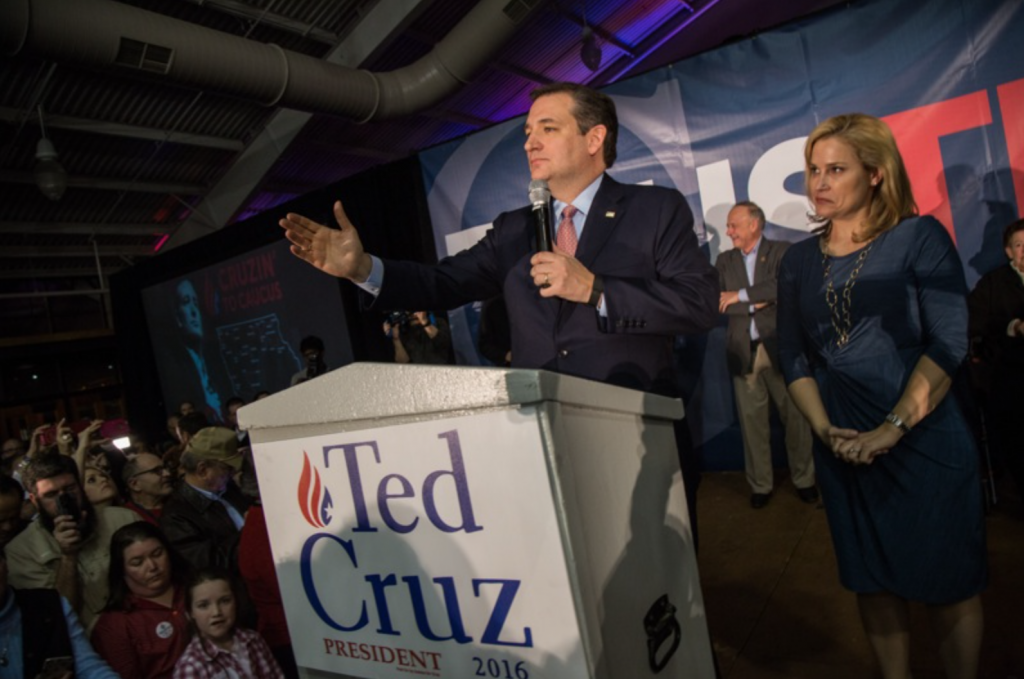Helton: 20 Out of 20: We need to talk about Russian election meddling
Presidential candidate Sen. Ted Cruz, R-Texas holds a caucus night watch party at the Iowa State Fair Elwell Center in Des Moines, Iowa on Monday Feb. 1, 2016. Senator Ted Cruz celebrated a 28 to 24 percent victory over fellow Republican presidential candidate Donald Trump. (The Daily Iowan/Anthony Vazquez)
July 26, 2018
Being a political writer in Iowa has an awesome perk: caucuses. We’re first in the nation and proud of it. Presidential hopefuls from all over flock to our state to persuade Iowans of all stripes to caucus for them. As ugly as politics can be, the caucuses are a party worth having, and our great state gets to be the host.
Church leaders for Ted Cruz or Ben Carson? Great. College kids debating Hillary and Bernie? Cool. That one weirdo who won’t stop talking about Martin O’Malley? They’re invited to the party, too. Crashing the party would do irrevocable damage to the American democratic process. Like the old saying goes, it’s all fun and games until Russia comes in and ruins everything.
You might be thinking that we don’t have enough information about Russian interference with the 2016 presidential election, let alone what the Russians plan to do in this year or years to come. But we know plenty.
We know that Russian hackers followed orders from their government’s version of the CIA, the GRU, and got into the systems of a software company that was contracted to handle voter registration. And this isn’t some left-wing conspiracy theory, it’s coming from Deputy Attorney General Rod Rosenstein, a Republican who was the longest serving U.S. Attorney at the time of his appointment to the Department of Justice. The hacking was just one detail in Rosenstein’s press conference where he announced indictments for 12 Russian agents involved in the operation.
But, it wasn’t just one hack. We also know that Russian hackers used phishing techniques to steal emails from prominent Democrats. The Russian unit worked under the fake name “Guccifer 2.0” and posed as a lone wolf Romanian hacker to attempt to cover their tracks
They used Wikileaks to slowly publish the embarrassing emails in the weeks leading up to the election. Clinton’s polling lead shrank a small but noticeable amount in that same timeframe.
We’ve known most of this for a while. The 12 indictments were announced by Rosenstein on July 13. As for the “Guccifer 2.0” gambit, we’ve known about that since October 2016, even before the election. Former acting CIA Director Mike Morrell said at the time that it was “absolutely clear … WikiLeaks and Guccifer 2 are working with the Russians on this.”
Even if all of this didn’t change a single vote, even if it was a fruitless effort by a foreign adversary to mess with our election, the point is the Russians tried, and they’ll do it again, given the chance.
Bringing it back to our first-in-the-nation Iowa Caucuses, what are we going to do to defend ourselves? What’s stopping countries with generations of ire against the United States from influencing our presidential selection process? They’re isn’t too much Congress can do. The most recent defense spending bill merely offers nonbinding guidance for U.S. Cyber Command to focus more on defending against Russian cyberattacks, but that’s about it. The executive branch can change how it wants to implement that policy.



